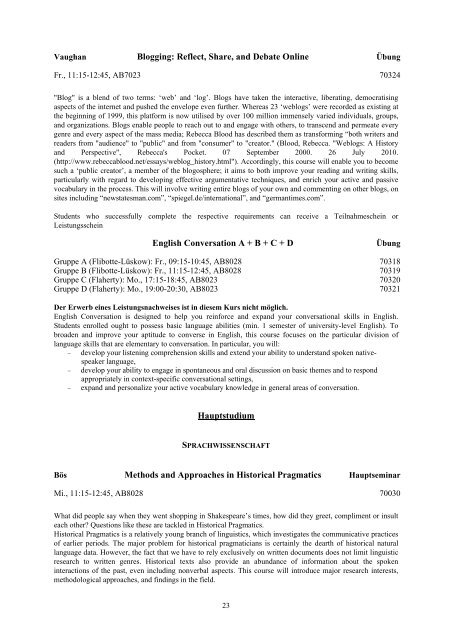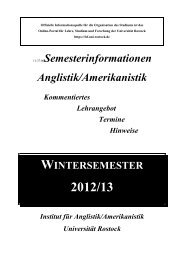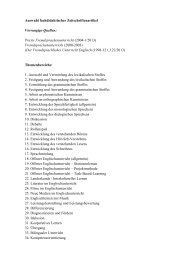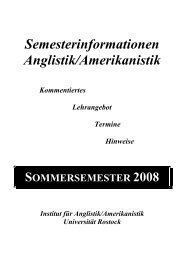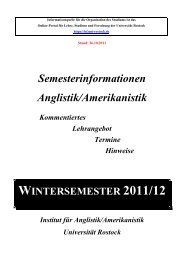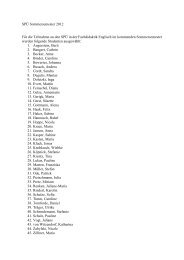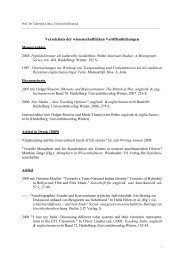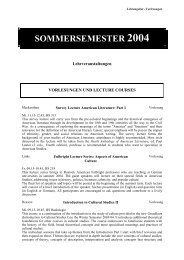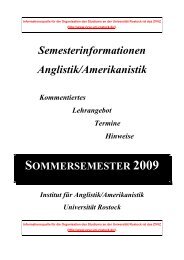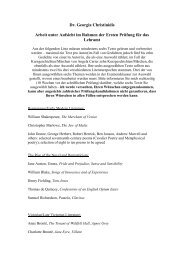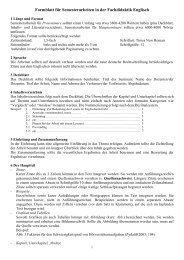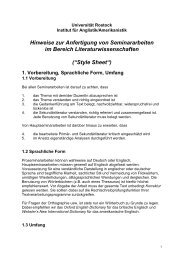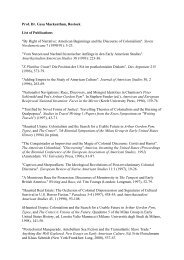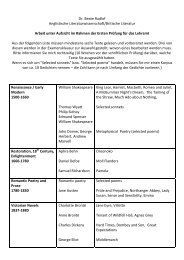Semesterinformationen Anglistik/Amerikanistik - Institut für Anglistik ...
Semesterinformationen Anglistik/Amerikanistik - Institut für Anglistik ...
Semesterinformationen Anglistik/Amerikanistik - Institut für Anglistik ...
Create successful ePaper yourself
Turn your PDF publications into a flip-book with our unique Google optimized e-Paper software.
Vaughan Blogging: Reflect, Share, and Debate Online Übung<br />
Fr., 11:15-12:45, AB7023 70324<br />
"Blog" is a blend of two terms: ‘web’ and ‘log’. Blogs have taken the interactive, liberating, democratising<br />
aspects of the internet and pushed the envelope even further. Whereas 23 ‘weblogs’ were recorded as existing at<br />
the beginning of 1999, this platform is now utilised by over 100 million immensely varied individuals, groups,<br />
and organizations. Blogs enable people to reach out to and engage with others, to transcend and permeate every<br />
genre and every aspect of the mass media; Rebecca Blood has described them as transforming “both writers and<br />
readers from "audience" to "public" and from "consumer" to "creator." (Blood, Rebecca. "Weblogs: A History<br />
and Perspective", Rebecca's Pocket. 07 September 2000. 26 July 2010.<br />
(http://www.rebeccablood.net/essays/weblog_history.html"). Accordingly, this course will enable you to become<br />
such a ‘public creator’, a member of the blogosphere; it aims to both improve your reading and writing skills,<br />
particularly with regard to developing effective argumentative techniques, and enrich your active and passive<br />
vocabulary in the process. This will involve writing entire blogs of your own and commenting on other blogs, on<br />
sites including “newstatesman.com”, “spiegel.de/international”, and “germantimes.com”.<br />
Students who successfully complete the respective requirements can receive a Teilnahmeschein or<br />
Leistungsschein<br />
English Conversation A + B + C + D<br />
Gruppe A (Flibotte-Lüskow): Fr., 09:15-10:45, AB8028<br />
Gruppe B (Flibotte-Lüskow): Fr., 11:15-12:45, AB8028<br />
Gruppe C (Flaherty): Mo., 17:15-18:45, AB8023<br />
Gruppe D (Flaherty): Mo., 19:00-20:30, AB8023<br />
Übung<br />
70318<br />
70319<br />
70320<br />
70321<br />
Der Erwerb eines Leistungsnachweises ist in diesem Kurs nicht möglich.<br />
English Conversation is designed to help you reinforce and expand your conversational skills in English.<br />
Students enrolled ought to possess basic language abilities (min. 1 semester of university-level English). To<br />
broaden and improve your aptitude to converse in English, this course focuses on the particular division of<br />
language skills that are elementary to conversation. In particular, you will:<br />
develop your listening comprehension skills and extend your ability to understand spoken nativespeaker<br />
language,<br />
develop your ability to engage in spontaneous and oral discussion on basic themes and to respond<br />
appropriately in context-specific conversational settings,<br />
expand and personalize your active vocabulary knowledge in general areas of conversation.<br />
Hauptstudium<br />
SPRACHWISSENSCHAFT<br />
Bös Methods and Approaches in Historical Pragmatics Hauptseminar<br />
Mi., 11:15-12:45, AB8028 70030<br />
What did people say when they went shopping in Shakespeare’s times, how did they greet, compliment or insult<br />
each other? Questions like these are tackled in Historical Pragmatics.<br />
Historical Pragmatics is a relatively young branch of linguistics, which investigates the communicative practices<br />
of earlier periods. The major problem for historical pragmaticians is certainly the dearth of historical natural<br />
language data. However, the fact that we have to rely exclusively on written documents does not limit linguistic<br />
research to written genres. Historical texts also provide an abundance of information about the spoken<br />
interactions of the past, even including nonverbal aspects. This course will introduce major research interests,<br />
methodological approaches, and findings in the field.<br />
23


